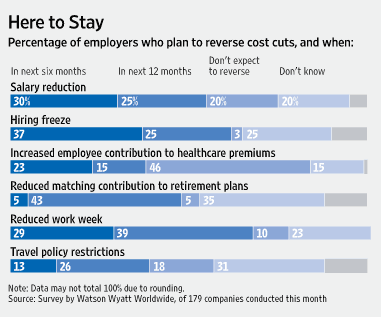A month or so ago, I wrote a post about the semi-permanent digression that occurred in the early 1990’s between U.S. unemployment rates and California unemployment rates. The cliff notes version is that from the early ’90’s on California unemployment has averaged about 2% more than the national average through all of the economic cycles.
I think as do lots of others that the cutback in defense spending that occurred at the end of the Cold War so devastated the defense industry in California that its economy never fully made up for the lost jobs. The question that this raised in my mind was would the current recession do the same thing to the country as a whole. Would it permanently raise the base unemployment rate. In other words would we end up redefining full employment.
It’s certainly too early to answer that question but a new WSJ survey indicates that it might indeed happen.
According to a new survey, 52% of companies expect to employ fewer people in three to five years than they did before the recession began. The survey of 179 companies was conducted this month by consulting firm Watson Wyatt Worldwide Inc.
Among employers who have cut salaries, 55% expect to restore the cuts in the next year. But 20% expect the cuts to be permanent. Of employers who have increased employee contributions to health-care premiums, 46% don’t plan to reverse the increases. Of all survey respondents, 73% said they expect employees to shoulder more of the cost of health care than before the recession began.
Nearly half of the employers who have cut their contributions to retirement plans expect to reinstate them in the next year. The remainder plan to restore the contributions after that, expect the cut to be permanent, or aren’t sure.
“We’re not going to go back to the status quo,” says Laurie Bienstock, national director of Watson Wyatt’s strategic-rewards practice.

I don’t think we should be at all surprised if the country ends up emulating California. I suspect the recession has either demonstrated to a lot of employers that they could operate more leanly than they thought or convinced many that smaller and more liquid might be the safer way to run their company. The real surprise might well be the types of jobs that don’t come back. For instance, the recession has shaken the legal profession to its roots. Layoffs and salary cuts have run through the industry and one does have to wonder if the shocks might not engender some permanent change.
I guess that just proves that even in the biggest of weed patches there blooms a rose or two.
- Bulenox: Get 45% to 91% OFF ... Use Discount Code: UNO
- Risk Our Money Not Yours | Get 50% to 90% OFF ... Use Discount Code: MMBVBKSM
Disclaimer: This page contains affiliate links. If you choose to make a purchase after clicking a link, we may receive a commission at no additional cost to you. Thank you for your support!



Leave a Reply